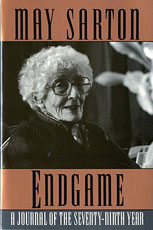"My seventy-eighth birthday. It’s hard to believe I am still around to be glad the sun is out at last and the daffodils crowding the wood’s edge with abundant grace," writes poet and novelist May Sarton in her journal. It was not a great year for her as she notes in the Preface where she describes the pain and frailty stemming from a fibrillating heart, a left lung filled with fluid, and irritable bowel syndrome. Nonetheless, Sarton soldiers on learning to use a dictating machine instead of a typewriter. She realizes that for the first time in her life she has come to be dependent on others for help.
The author concurs with Pierre Teilhard de Chardin who observed, "There is a time for growth and a time for diminishment in the lives of each one of us. At one moment the dominant note is one of constructive human effort, and at another . . . annihilation."
Sarton laments the passing of "a life-enhancing friend," rejoices in her journal as good medicine that helps her to sort out what’s important in her life, the importance of memory, the subtlety of the film The Whales of August, the mesmerizing effect of the sea upon people who visit her in Maine, the messages about our culture delivered in the video of I Heard the Owl Call My Name, and the spiritual nourishment she derives from reading Barbara Kingsolver’s Animal Dreams.
